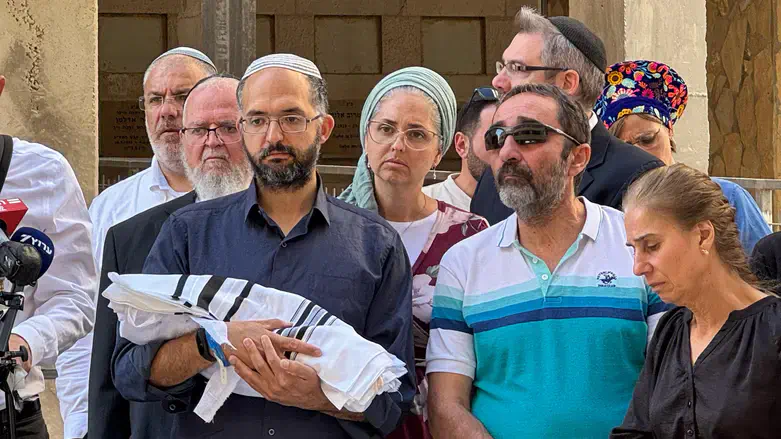
What does it mean to be a Jew?
It’s not a question answered in comfort. It’s answered in cemeteries. In silence. In the space between grief and God.
Two weeks ago, Chananel Gez buried his wife, Tzeela, murdered in a terrorist attack in the Shomron. Several days ago, he buried their 15-day-old son, Ravid Chaim. Most would collapse under the weight. But Chananel stood.
At his wife’s funeral, he whispered through tears:
“We are broken. But we are one.”
At his baby’s funeral, he didn’t scream. He sang.
“We are unstoppable, even when our hearts are broken,” he said. And then led mourners in Hamalach Hagoel, ancient words asking God to protect our children. He sang it to a child he would never hold again.
What kind of people sing lullabies at gravesites? To their dead baby?
Jews do.
This is what it means to be a Jew—not to live without pain, but to live with purpose despite it. Not to avoid the fire, but to carry our faith through it.
The Piaseczno Rebbe, Rabbi Kalonymus Kalman Shapira—writing from the Warsaw Ghetto—offers a piercing reflection in Esh Kodesh on Parshat Chayei Sarah. He asks: Why does Sarah die immediately after the Akeidah, after nearly losing her son?
He answers: because even the greatest souls can be broken. Even our matriarchs have limits. Her death wasn’t a collapse of faith—it was the unbearable weight of trauma. And yet, the Rebbe—surrounded by death, despair, and destruction—kept writing. He didn’t excuse the suffering. He held it up to the heavens. He cried through ink, but he wrote in faith.
Because emunah isn’t pretending you’re not hurting. It’s refusing to walk away from God while you do.
That’s our inheritance.
To be a Jew is to carry unanswered questions and unrelenting trust. It’s to hold a Torah in one arm and a broken heart in the other. It’s to light candles in Auschwitz. To dance at weddings in Sderot. To build homes in the Shomron. To sing lullabies over fresh graves and still whisper: “Shema Yisrael.”
We are not the people who believe because we’ve never suffered. We are the people who believe because we have.
From Sarah to the Warsaw Ghetto. From the Shoah to the Shomron. From six million silenced voices to one father’s trembling song—we believe.
Chananel Gez reminded the world this week what it means to be a Jew. Not a life of ease. A legacy of defiance. A covenant of courage. A people who say: Even now. Especially now. I believe.